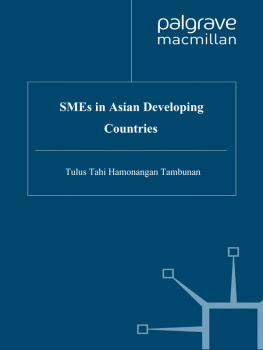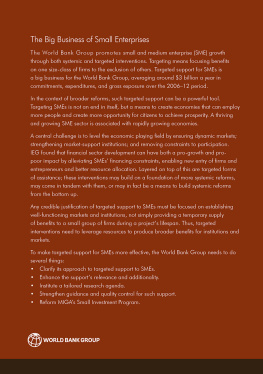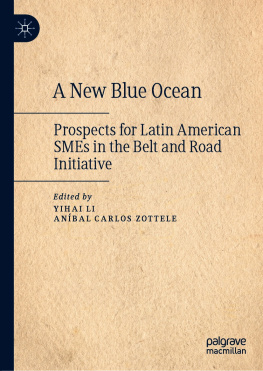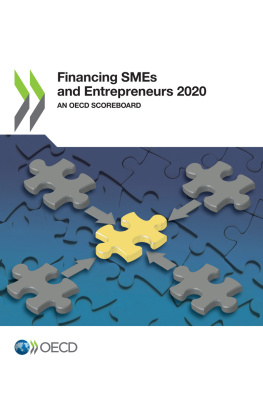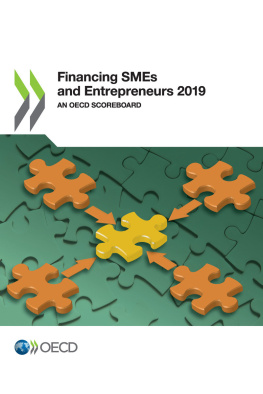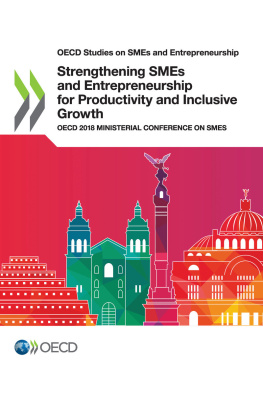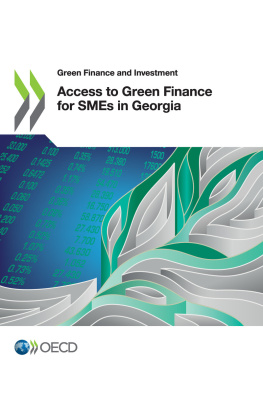SMEs in Asian Developing Countries
SMEs in Asian Developing Countries
Tulus Tahi Hamonangan Tambunan


Tulus Tahi Hamonangan Tambunan 2009
All rights reserved. No reproduction, copy or transmission of this publication may be made without written permission.
No portion of this publication may be reproduced, copied or transmitted save with written permission or in accordance with the provisions of the Copyright, Designs and Patents Act 1988, or under the terms of any licence permitting limited copying issued by the Copyright Licensing Agency, Saffron House, 6-10 Kirby Street, London EC1N 8TS.
Any person who does any unauthorized act in relation to this publication may be liable to criminal prosecution and civil claims for damages.
The author has asserted his right to be identified as the author of this work in accordance with the Copyright, Designs and Patents Act 1988.
First published 2009 by
PALGRAVE MACMILLAN
Palgrave Macmillan in the UK is an imprint of Macmillan Publishers Limited, registered in England, company number 785998, of Houndmills, Basingstoke, Hampshire RG21 6XS.
Palgrave Macmillan in the US is a division of St Martins Press LLC, 175 Fifth Avenue, New York, NY 10010.
Palgrave Macmillan is the global academic imprint of the above companies and has companies and representatives throughout the world.
Palgrave and Macmillan are registered trademarks in the United States, the United Kingdom, Europe and other countries.
ISBN-13: 978-0-230-23037-8 hardback
ISBN-10: 0-230-23037-7 hardback
This book is printed on paper suitable for recycling and made from fully managed and sustained forest sources. Logging, pulping and manufacturing processes are expected to conform to the environmental regulations of the country of origin.
A catalogue record for this book is available from the British Library.
A catalog record for this book is available from the Library of Congress.
10 9 8 7 6 5 4 3 2 1
18 17 16 15 14 13 12 11 10 09
Printed and bound in Great Britain by
CPI Antony Rowe, Chippenham and Eastbourne
I dedicate this book to my wife, Maud Herati Tambunan, for all her support in my work and in my life, and my children, Priya and Adriel, for making me feel young and happy.
Figures
Tables
Preface
It has been recognized worldwide that small and medium enterprises (SMEs) play a vital role in the economic development of developing countries, including those in Asia, as the enterprises have proved to be the primary source of job/employment creation and output growth. SMEs are important not only from the economic perspective but also socially and politically because of their potential contributions to poverty reduction, improvement of income distribution, and rural development. For this reason, governments in many Asian developing countries such as Indonesia, Malaysia, Thailand, and India, are supporting capacity building in their SMEs largely through direct interventions with a variety of programs, of which subsidized credit schemes are the most important one. In Indonesia, for instance, government has intervened to support SMEs development in a number of ways such as subsidized credit, human resource development training in production technique, management, and entrepreneurship, provision of total quality control and technical assistance, Internet facility, advisory extension workers, subsidized inputs, marketing and promotion facilitation, establishments of business development services and common service facilities inside industry clusters, establishment of special small-scale industrial estates, partnership program, establishment of the export support board of Indonesia (DPE), and implementation of an incubator system for promoting the development of new entrepreneurs. Various government departments such as the Ministry of Industry, the Ministry of Trade, and the Ministry of Cooperative and SME have taken the lead in MSME development policies.
In the past, in about the 1970s, international organizations, especially the World Bank, the Asian Development Bank (ADB), and the United Nation Industry and Development Organisation (UNIDO), initiated and implemented many programs and projects, financially as well as technically, to empower SMEs in Asian developing countries. Also many governments from rich countries have been actively supporting SMEs in Asian developing countries countries as well as in other developing countries, for instance, USAID and the Asia Foundation (United States), GTZ (Germany), CIDA (Canada) and JICA (Japan).
This book is about development of SMEs in Asian developing countries, which include China, India, Pakistan, Indonesia, Malaysia, Thailand, Lao PDR, Bangladesh, and Vietnam. It is based on a survey of key literature and most recent national data on SMEs in the region with the focus on the following issues: (i) growth of SMEs, (ii) export development, (iii) main constraints facing SMEs, (iv) competitiveness, innovation and technology transfer, and (v) women entrepreneurs.
deals with recent development of SMEs in the region. Although promoting SMEs is currently an important public issue in many Asian developing countries and is increasingly getting attention not only from the academic world but also from policymakers, some of these countries have limited information (i.e. official data and literature) on the current state of their SMEs. As a result, some Asian developing countries are not covered in this chapter, and among countries included, SMEs in some countries are discussed more deeply than those in others.
In some countries, for example, India, Pakistan, Thailand, and Indonesia, SMEs in the manufacturing industry have also been playing an important role in export, directly or indirectly (e.g. through subcontracting arrangements with LEs); although the level of export involvement varies by country. This issue is discussed in . It also addresses the question of whether trade liberalization will have positive or negative effects on SMEs. This is an important concern since over the past two decades international trade regimes in many Asian countries, especially in Southeast Asia, have undergone a fundamental change vis--vis liberalization.
There is no doubt that the export performance of SMEs is influenced by their competitiveness. Most SMEs in developing countries have low global competitiveness.This can be a serious obstacle for the enterprises access not only to international markets but also to the domestic market since their products are unable to compete with imported goods. It is often argued in the literature that the key to increasing the competitiveness of SMEs in developing countries is to increase their capacity through improved technology. Technology development in SMEs can take place internally (inside the firm) or can be fostered through transfer of technology from developed countries. SMEs competitiveness and technology transfer to the enterprises are covered in .
The development of SMEs is hampered by many constraints that differ from region to region. There may be differences between rural and urban areas, between sectors, or between individual enterprises within a sector. However, there are a number of constraints common to all SMEs, including the lack of capital, human resource, technology and information; difficulties in procuring raw materials, marketing and distribution; high transportation costs, etc. This aspect of the SMEs is discussed in .
developing countries also has a great potential not only in empowering women but also society in the region. Yet in many of these countries, especially where the level of economic development, reflected by the level of income per capita and the degree of industrialization, is still low, this potential remains largely untapped. This chapter tries to identify and discuss main factors that influence the role of women as entrepreneurs in these countries.
Next page
